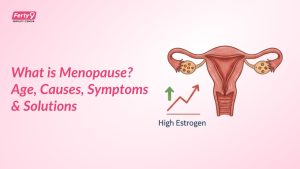Infertility is distressing but can be treated. In fact, there are several facets to infertility treatment, and couples can opt for a treatment plan that suits them.
Unexplained infertility happens to be a term healthcare providers use in order to describe infertility after tests reveal no obvious cause for one’s fertility problems. Providers end up only diagnosing unexplained infertility after both partners have undergone complete fertility evaluations.
Tests indicate:
- No uterine abnormalities or even structural issues with one’s uterus.
- Ovulation does occur at regular intervals.
- One’s fallopian tubes are open with no obstructions.
- The egg count is good (ovarian reserve).
- One’s brain produces normal levels of the hormones required for reproduction.
- The partner’s semen analysis is normal (count, amount, motility, and shape).
Suggested read: Why Male Infertility Rates Are Rising in India?
Causes of unexplained infertility
Unexplained infertility has rather no cause, or if a cause does exist, providers are unable to measure it or test for it.
A few possible reasons for unexplained infertility are:
- Undiagnosed underlying condition: Celiac disease (a gluten allergy), diabetes, and thyroid conditions do contribute to infertility.
- Endometriosis: Even mild cases of endometriosis can lead to infertility.
- Cervical mucus: If cervical mucus is thick or contains certain ingredients, sperm may be unable to travel via one’s cervix and vagina to get to one’s uterus.
- Egg quality: Healthcare providers can rather measure the number of eggs via an ultrasound (by looking at follicles in one’s ovary), but ultrasound does not tell them about egg quality. Blood tests and ultrasounds can provide clues about the quality of the eggs, but they are not definitive diagnoses.
- Sperm quality: Similar to egg quality, a sperm analysis does reveal most problems with sperm. But there may be other issues with sperm that contribute to unexplained infertility.
- Uterine lining: The endometrium is the lining of one’s uterus. A luteal phase defect happens when one’s endometrium does not thicken or prepare itself for a fertilized egg. This does imply that if an egg gets fertilized, it cannot implant, which means pregnancy is not possible.
- Poorly timed intercourse: The frequency or timing of sex is not matching up with ovulation.
What are infertility treatments for unexplained infertility?
Assisted Reproductive Technology (ART)
ART happens to be a type of fertility treatment that involves part of the fertilization process happening in a lab. ART treatment does include intrauterine insemination (IUI) and in vitro fertilization (IVF).
Medications
Medications that stimulate egg production as well as ovulation are useful and can be used alone or with IUI and IVF treatment.
Lifestyle changes
Several lifestyle factors contribute to infertility. Few that can do to help the chances of conceiving are:
- Avoid smoking, drinking alcohol, and using recreational drugs.
- Maintaining a healthy weight.
- Eating a well-balanced diet.
- Trying to get 30 minutes of exercise each day.
- Limiting caffeine consumption.
- Reducing one’s stress.
Improved timing of intercourse
There is indeed a small window of time in one’s menstrual cycle when conception can occur. The healthcare provider may be able to help identify this window to maximize the chances of getting pregnant. This could mean taking one’s temperature, charting one’s cycle, or using ovulation kits to predict ovulation.
Prevention:
- Weight: maintaining healthy weight levels.
- Smoking tobacco and also drinking alcohol: Avoid smoking cigarettes and, of course drinking too much alcohol.
- Sexual history: Reducing the risk of sexually transmitted infections (STIs) by wearing condoms.
Conclusion
Availability of infertility treatment can resolve pregnancy issues. Few couples as well as individuals do find success by using medication, IUI, or IVF. Unexplained infertility does no mean having a baby is no possible.




























